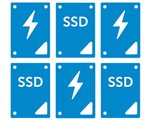 The era of storage technology haves and have-nots is over as Dell today makes high-capacity all-flash arrays (AFAs) accessible for businesses of all sizes and budgets. Breaking down one of the last barriers to universal enterprise flash deployment, the new Dell Storage SC4020 Entry-Level All-Flash configuration is the latest stroke in Dell’s relentless drumbeat of pragmatic, workload-oriented flash development.
The era of storage technology haves and have-nots is over as Dell today makes high-capacity all-flash arrays (AFAs) accessible for businesses of all sizes and budgets. Breaking down one of the last barriers to universal enterprise flash deployment, the new Dell Storage SC4020 Entry-Level All-Flash configuration is the latest stroke in Dell’s relentless drumbeat of pragmatic, workload-oriented flash development.
With an advertised street price of $25,000, the new SC Series array offers the lowest entry cost for an all-flash array by any major vendor*. IT managers who never thought they could afford flash datacenters will now create revolutionary business advantages for their companies. And purveyors of over-priced, less flexible AFAs will have some serious “splainin” to do to their customers…
Economical, expandable starting point
The SC4020 Entry-Level All-Flash configuration, available worldwide in early 2015, ships with six 480GB enterprise-class read-intensive SSDs, providing over 2.8TB raw flash capacity – and enough performance to make your apps wish they’d never heard of spinning disk for Tier 1. Read-intensive SSDs provide top performance for read-intensive workloads, such as data warehousing or video streaming (obviously) – but their write performance is also up to 10x greater than traditional hard drives, offering ultra-low latency and exceptional $/IOPs value.
 Beyond the initial six SSDs, customers can expand to 24 drives within the SC4020’s space-saving 2U chassis, or add expansion enclosures for up to 120 drives in a single array. Customers have the option to grow their Entry-Level array with additional read-intensive drives, or for even greater performance, they can create a full Dell Flash-Optimized solution by adding a flexibly-sized tier of write-intensive drives.
Beyond the initial six SSDs, customers can expand to 24 drives within the SC4020’s space-saving 2U chassis, or add expansion enclosures for up to 120 drives in a single array. Customers have the option to grow their Entry-Level array with additional read-intensive drives, or for even greater performance, they can create a full Dell Flash-Optimized solution by adding a flexibly-sized tier of write-intensive drives.
This is where Dell’s unique intelligent tiering kicks in. Multiple tiers of flash are automatically optimized with multiple dynamically-provisioned RAID levels per tier – and per drive! Thanks to the cost-leveling advantages of blending diverse drive types for their specific “best of all worlds” attributes, performance can actually be amped up as the array expands – while $/GB remains nearly unchanged!
Is your array all-flash…or “flash-only?”
Better still, despite its formidable flash performance and efficiency, the SC4020 solution does not limit your options for even greater cost savings through hybrid deployments in the future. Many competing AFAs are unable to tier data between SSDs and traditional spinning disks. Unlike these “flash only” arrays, both the Dell Entry-Level and Flash-Optimized solutions may be further cost-reduced by adding a tier of inexpensive hard disks at any time.
As volumes grow, most customers will find it economically beneficial to move cold storage to “cheap and deep” HDDs. Applications won’t know the difference, but costs will plummet. And since IDC estimates the market for hybrid flash to be 10x that of all-flash, building in hard drive support seems like a reasonable precaution for Dell to take for its customers. Seriously, why would you buy an array without this capability?
With over 400TB max system capacity, and enough density to host 10,000 MS-Exchange mailboxes in a 2U chassis, the SC4020 is ideal for workloads ranging from VDI to SQL or Oracle OLTP. And it’s not just entry costs that are affordable – ease of management, support and software licensing all contribute to the overall value. In fact, ESG Labs found SC4020 total lifecycle costs up to 54% lower than its competitors.
The days of the high-priced AFA are numbered – and once you check out this product, I’m guessing you will never look at flash the same way again. The company that brought you flash for the price of disk now brings you an all-flash array for $25K.
Contact a Dell expert today to learn more about our storage solutions that never stop saving.
*Based on Dell internal analysis leveraging data from industry sources for US list and typical discount prices of mid-range arrays over 1TB, including support, as of October 28, 2014